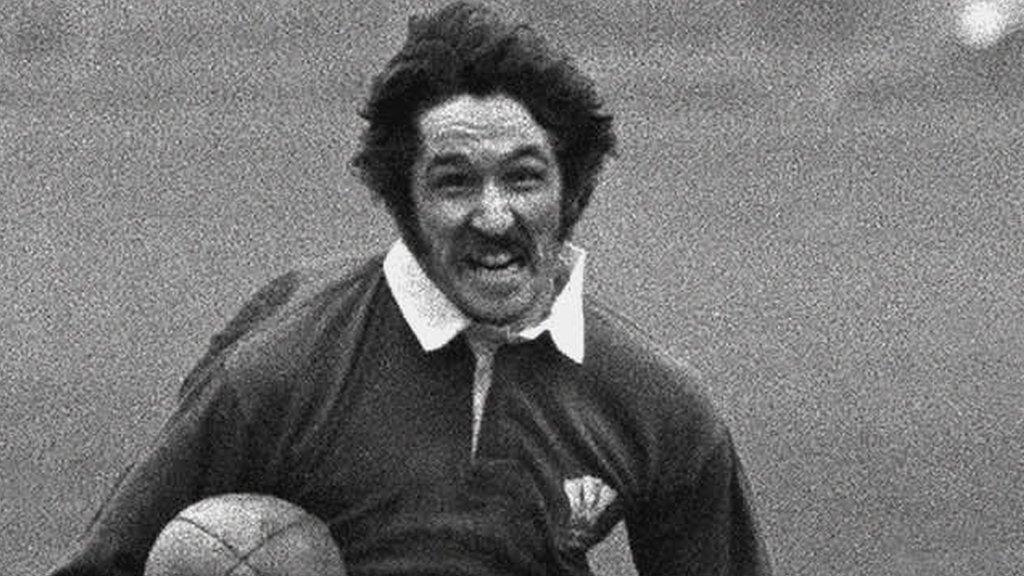Same outcome, not same old story for Scotland v All Blacks
- Published
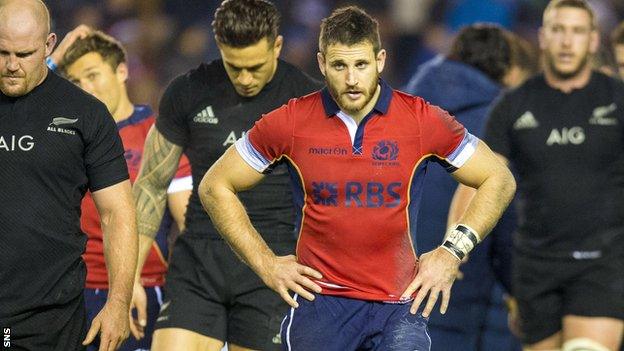
Scotland try-scorer Tommy Seymour was left disappointed against New Zealand
The team they called the Colonials, and which would later be renamed the All Blacks, arrived in Edinburgh this very week 109 years ago.
They were the first New Zealand team to play rugby in this part of the world and, according to the diary of one of their players, a full-back called Billy Wallace, were made to feel about as welcome in Scotland as a "plague of the small pox".
There was a dispute over money, a dispute over mouldy bread being shoved into their boots at their hotel the night before they played the Scots, a dispute on the pitch when one of the Kiwis was knocked unconscious and further rancour when the retribution came - or, as Wallace termed it, "a merry mix-up".
So much has changed in the years since - and yet so little. Scotland are still without a win over the behemoths of the southern hemisphere.
Saturday's 24-16 defeat was, of course, very different to so many that preceded it. It was nothing like the humiliation of before.
The last time these nations met, New Zealand scored four tries in the first half and six in all. The time before that, they again scored four tries in the first 40 minutes and seven in all.
Before this game, there was some chat about Steve Hansen, the New Zealand coach, disrespecting the Scots by fielding a weakened side, but respect is hard-earned.
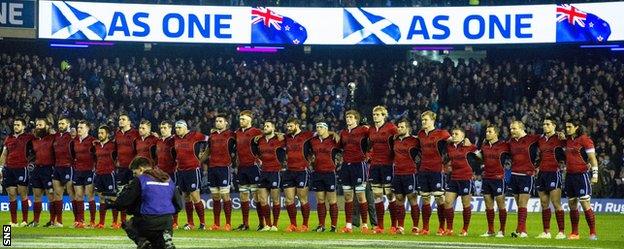
Scotland have improved as a unit under new coach Vern Cotter
New Zealand have become accustomed to exhibition matches at Murrayfield. No wonder he experimented. This was the game to do it. History told him that.
For as long as most of us can remember, this fixture has been a rout; New Zealand slick and clinical and Scotland fretful and error-ridden. Saturday, mercifully, was nothing like that. It was the same bottom line - defeat - but the nuances offer hope of a brighter future for this Scottish team.
We should be clear about one thing. Scotland were not playing the best team in the world at the weekend - more their body doubles.
The best team in the world has Israel Dagg at full-back, Conrad Smith in the centre and Julian Savea on the wing from the start, as opposed to his late cameo at Murrayfield. It has Owen Franks in the front row, Sam Whitelock in the second row and Jerome Kaino and Kieran Read in the back row.
The All Blacks that Scotland faced were decent, but in the minds of the Scottish players - if not the supporters - they were beatable. And, for 73 minutes, the dream stood a chance of coming true.
Scotland's intensity was magnificent. They hounded and harried. Rob Harley was a one-man wrecking ball.
There is ambition in this Scotland team. Youth too. Jonny Gray a colossus at 20, Adam Ashe is 21, Stuart Hogg and Finn Russell are 22, Harley is 24, Richie Gray, showing his world class at last, is 25.
Scotland v New Zealand factfile |
|---|
Scotland's record v New Zealand: Won 0 Draw 2 Lost 30 |
Scotland have scored four tries against the All Blacks in their past two meetings but managed just one in their previous five Tests against the 2011 world champions |
Saturday's was the Scots' narrowest losing margin since the All Blacks won 13-6 in the 1991 World Cup finals third-place play-off |
Where before, Scotland were a soft touch, now they are robust. Where before, you would have put your life on them conceding tries from some of the visits New Zealand had to their 22 in the opening half, now there was a belief that they could hold out.
And they did. They forced knock-ons with the ferocity of their tackling. They lived in New Zealand's face, refusing to allow them to settle while disrupting their once impregnable lineout.
Scotland had attitude and aggression. No backward steps. No fear. There were far too many wounding errors, but it was still a vast advance. The mental shift in this side has been something to see.
The Scots' lineout has been transformed. It's not just secure on its own ball, it's become an attacking weapon on opposition ball. Scotland comprehensively won the battle out of touch last weekend against Argentina and they won it again against the All Blacks - stealing three and messing with several others.
Given how wretched this set-piece was before Vern Cotter's arrival, it's a remarkable turnaround.
This time last year, Scotland lost six lineouts in their Test against the Springboks. They lost another four against the Wallabies and lost 10 in their first two matches of the Six Nations, against Ireland and England, some in critical areas and at critical times. To go from that to a point where they are now targeting opposition ball is a sign of a team that knows what it's doing.
Those four games - South Africa, Australia, Ireland and England - produced the sum total of zero tries for Scotland. There's been a step forward there, too. There's still a way to go, but Scotland's attacking threat is no longer limited to Stuart Hogg.
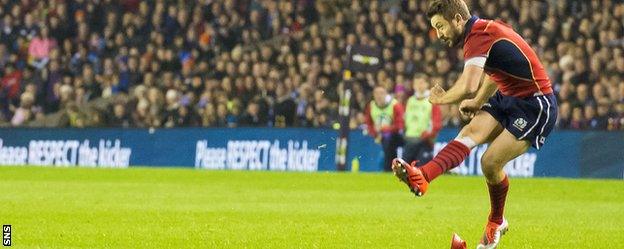
Greig Laidlaw missed a kick that would have given Scotland a late lead
There are issues, of course. Tight-head is a borderline crisis. Euan Murray is doughty as hell, but he's 34 and his deputy, Geoff Cross, will be 32 next month and is not seeing much action with London Irish. Beyond them, it's a propping desert. Cotter has to be worried.
Saturday was a salutary lesson for this Scottish team. You don't get too many chances to win big Test matches. If it's a lesson they heed then the Six Nations might offer more promise than at any time in the new millennium.
You only had to look at the body language of Cotter's team at the end to realise that the words "moral victory" meant nothing to them. Greig Laidlaw had a kick at goal in the 69th minute that would have put his side into a 19-17 lead had he made it. He missed. Laidlaw's demeanour in the aftermath was that of a man who knew the significance of what happened here.
How many chances does a Scottish player get at beating the All Blacks? In the past 23 years, they've never had one.
This was the moment for the current generation. There might be others, but history tells us otherwise. Hence, the haunted look on the faces of the older guard.
When an eight-point loss to the All Blacks - albeit a weakened version - almost breaks the heart of the Scottish dressing-room then you know things have changed. Cotter demands a higher standard and he's constructing a side that look capable of delivering.
- Published17 November 2014
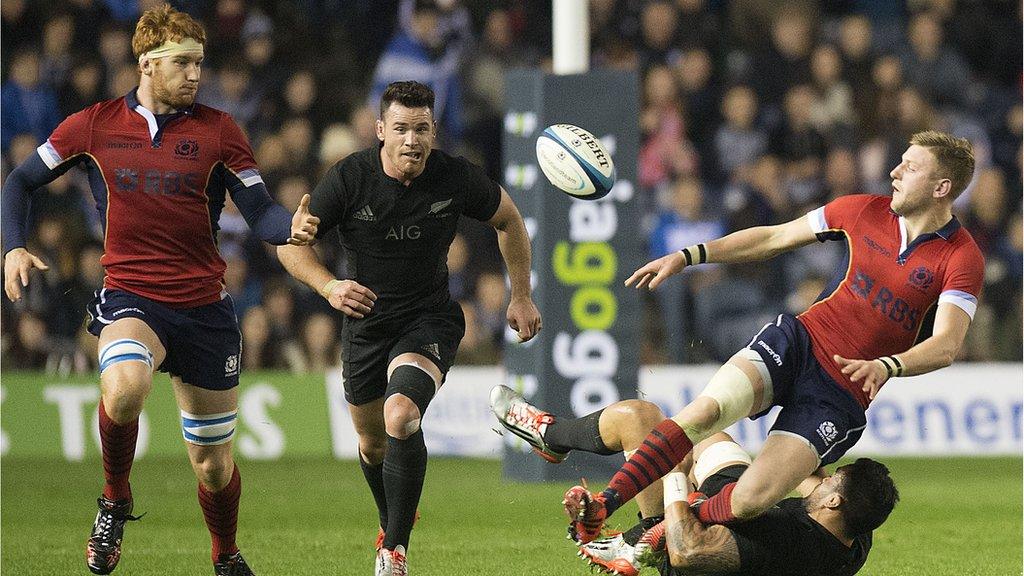
- Published16 November 2014

- Published16 November 2014
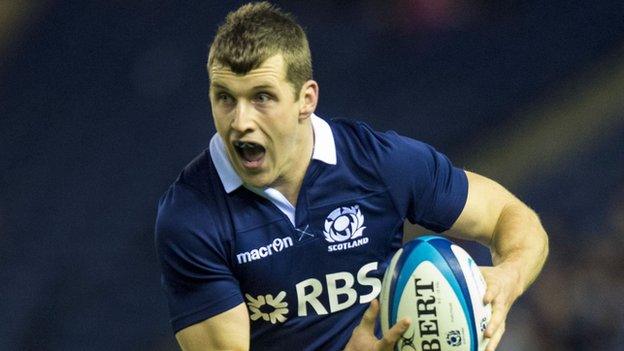
- Published15 November 2014
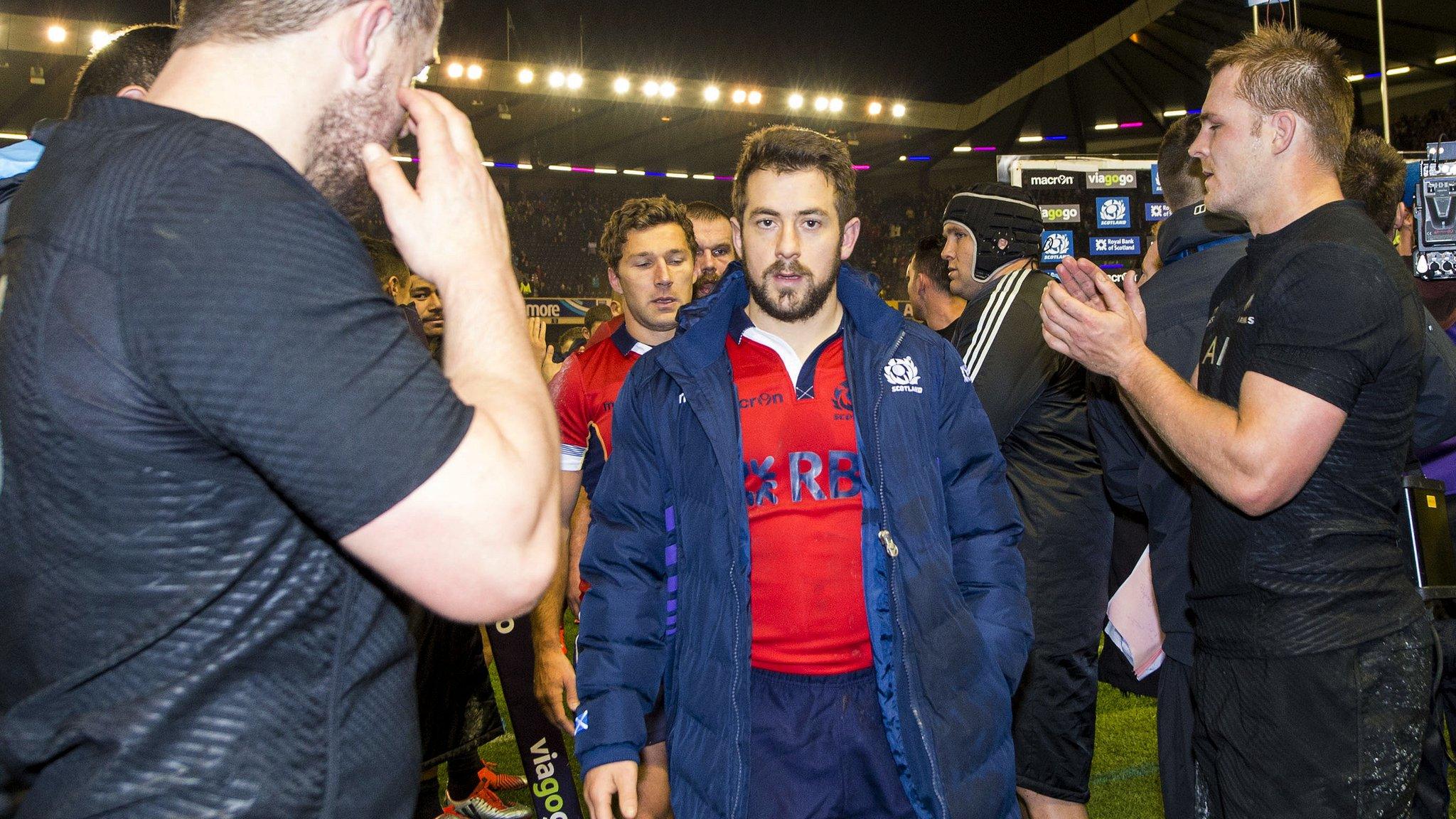
- Published15 November 2014
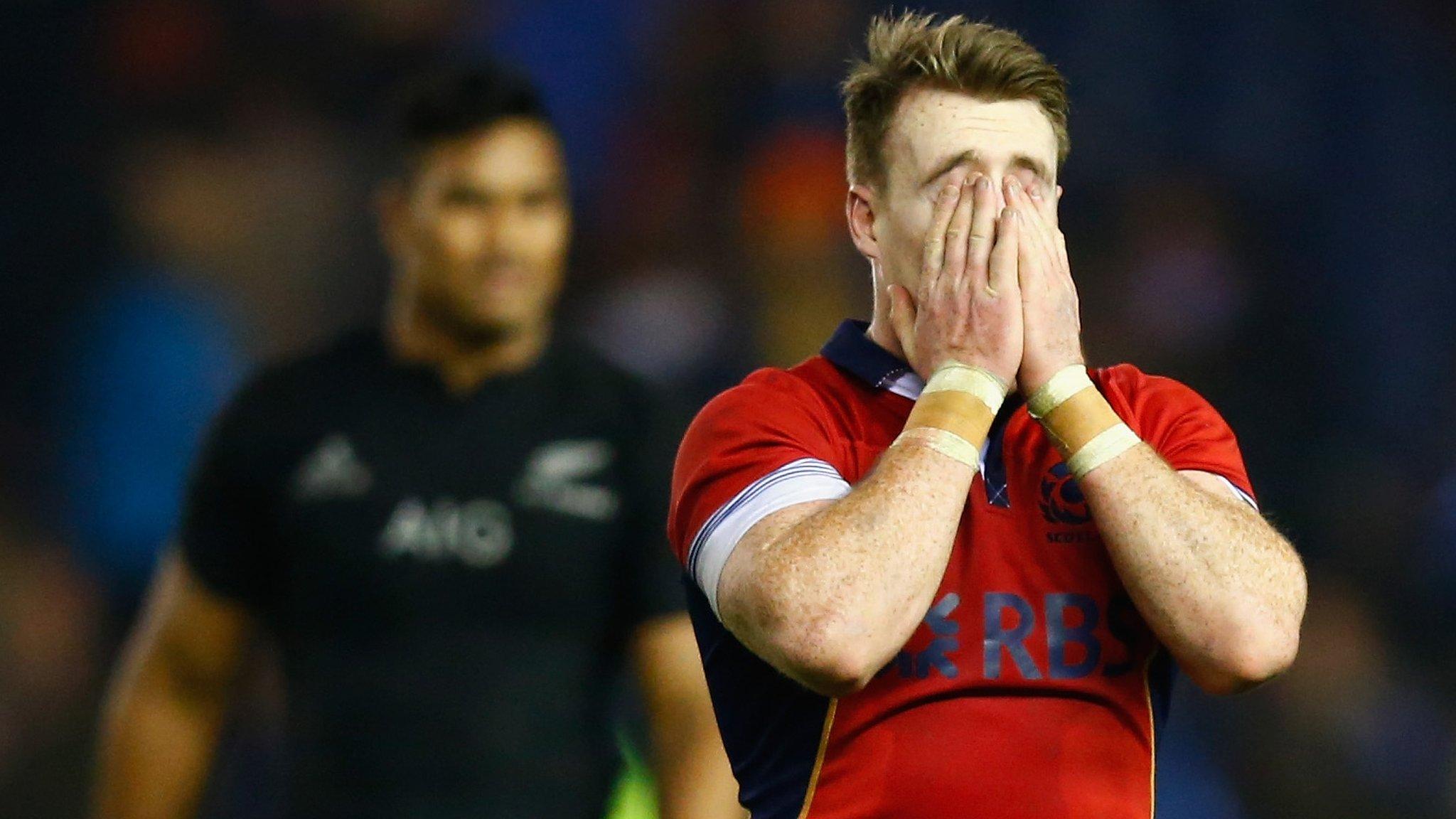
- Published8 November 2014
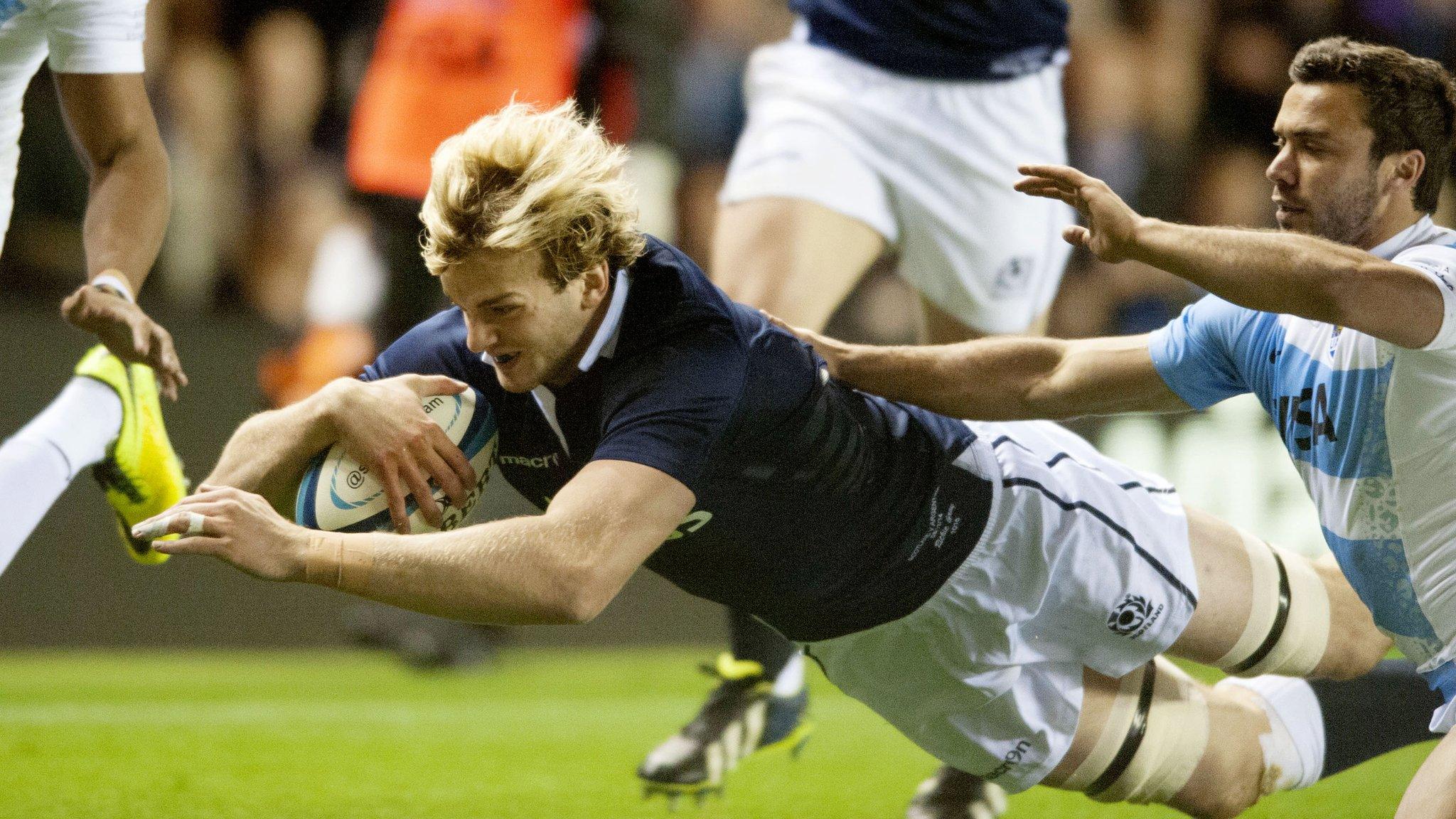
- Published14 September 2016

- Published25 August 2011
